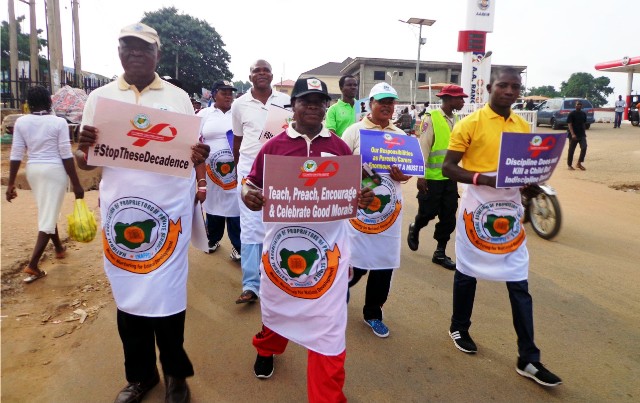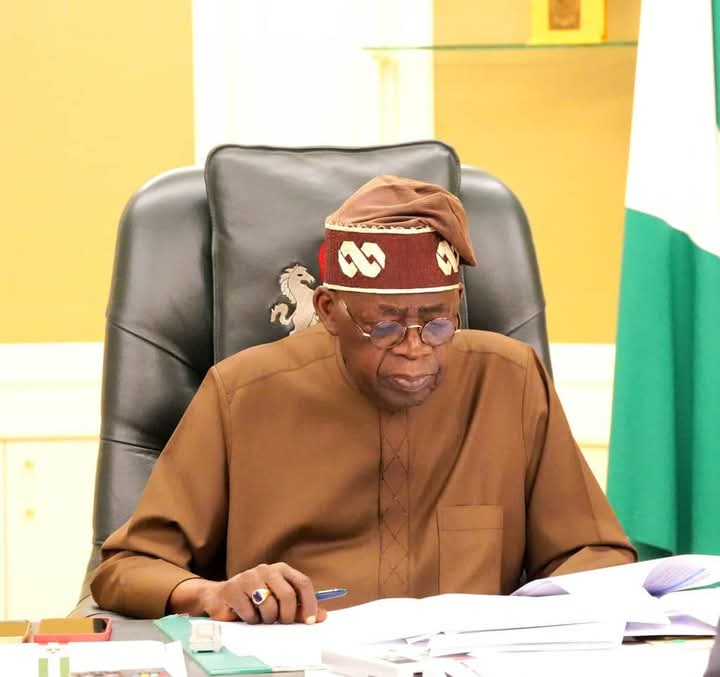Editorial
Checking Rising Child Defilement

A day hardly passes by without unpleasant news of child defilement, particularly against the girl-child
in Nigeria. Child desecration has assumed startling heights that deserve vigilance by the government. Child sexual abuse is an offence under several sections of Chapter 21 of the Criminal Code. These psychopaths deserve swift and severe retribution. There should be tougher penalties exacted on paedophiles and their enablers. The authorities must carry out inflexible laws to stamp out this evil.
The United Nations Children’ Fund (UNICEF) revealed in 2015 that one in four girls and one in 10 boys in Nigeria had encountered sexual violence before the age of 18. According to a survey by Positive Action for Treatment Access, over 31.4 per cent of girls said that their first sexual experience had been rape or forced sex of some kind. The Centre for Environment, Human Rights and Development recounted that 1,200 girls had been raped in 2012 in Rivers State.
Children are considered to be a source of enormous exhilaration to their families and future leaders of the nation, but many of these children remain victims of different forms of abuse, violence, and exploitation. Section 218 of the Criminal Code Act defines child defilement as the unlawful carnal knowledge of a girl under the age of 13 while the culprit that immerses in the act is guilty of a felony and liable to life imprisonment.
Defilement is traumatic and often associated with psycho-social problems in children. Defiled children, more often than not, have negative outcomes in terms of poor academic performance, low self-esteem, depression, and poor social relationships. They show cruelty to animals, have attention deficit, hyperactivity disorders, and teenage pregnancy, among others.
Some identified causes of defilement include carelessness of parents, improper dressing, drug abuse, absence of sex education, lack of cordial relationship between parents and children, inability to exercise self-control, and promiscuous lifestyles by parents. At times, offenders are found to engage in the dastardly behaviour for ritual purposes because they have got themselves involved in what they should not.
The culprits are usually the same – teachers, uncles, parents, clerics, neighbours and drivers. These are protectors who become predators. This is sheer wickedness! The 2014 UNICEF National Survey on Violence Against Children said one in four girls, and one in 10 boys, had also experienced sexual violence. The report added that more than 70 per cent of the victims experienced the violence repeatedly.
Regrettably, 60 per cent of child abuse cases are never made public. This allows a vast number of child abusers to go unpunished. Beyond the physical damage, studies have shown that sexually abused children develop psychosocial challenges. Some become sex addicts due to this premature exposure, while others turn to prostitution as they lose their sense of self-worth and self-dignity. Early signs include a drop in academic performance, depression and suicidal thoughts, say experts.
This crime is a global phenomenon, attracting diverse counter-measures by governments. Consequently, Nigeria’s federal and state governments need to step up measures as it has reached near-epidemic proportions in the country. Every other segment of the society, formal and informal, must join the crusade. Parents and guardians must take personal responsibility for the safety and security of their children and wards.
Regular medical check-ups can assist uncover evidence of defilement. Parents must fight frivolous and salacious compliments on their children by randy caregivers and neighbours passed off as jokes. Where a case of abuse is established, they must never consent to secret pacts and settlements. These embolden paedophiles to source more victims. Faith-based organisations, community leaders and traditional rulers should leverage their leadership positions for constant sensitisation against the plague.
Legal experts observe that there are certain provisions in the laws that are both adequate and inadequate and that one of the limiting factors associated with the criminal and penal codes is that they cover rape in general and not defilement. They say there are other things about child defilement that are not captured by the Act. Such include limitation of time at bringing up criminal allegations and charges against suspected persons in the court. The criminal code makes provision for only two months as its limitation period. This statute-barred barrier should be tackled.
What it takes to curb child defilement is a combination of strategies and efforts by everyone in society. In specific terms, people must desist from engaging in vicious acts such as going into rituals. They should be governed strictly by godly living. Victims of defilement should be spirited enough to report their unpleasant experiences to relevant governmental and non-governmental bodies for rehabilitation. They should expose perpetrators.
Parents should be intimate and more sensitive to their children’s needs. They should also instruct their children on sex education and scrutinise what they watch in the media and on the internet to be free from pornography and dangerous elements. Adults should have self-control, while parents have to avoid living promiscuous lifestyles that could influence their children negatively. Available laws and legislation need to be strengthened.
Publicly naming and shaming convicts will serve as a deterrent. Every state should have a regularly updated sex offenders list. Public advocacy groups should step up their activities. Paedophiles must be ostracised and made to face the full wrath of the law. Again, all states should domesticate the Child’s Rights Act and make its implementation easy, while the tie-ups militating against the smooth prosecution of cases in law courts should be discarded to successfully fight the menace in the country.
Editorial
No To Hike In Telecom Tariffs

Nigerians are outraged by the Federal Government’s approval of a 50 per cent increase in telecommunications tariffs, with organised labour threatening to mobilise workers to boycott telecom services. The Nigeria Labour Congress (NLC) and the Trade Union Congress of Nigeria (TUC) have described the upcoming tariff as outrageous, lamenting that it will worsen the already harsh living conditions of workers and the masses.
Similarly, the Coalition of Northern Groups (CNG) rejected the hike, stating that it was ill-timed and did not take into consideration the struggles of Nigerians. The Human Rights Writers Association of Nigeria (HURIWA) also criticised the review, calling it an illegal, unconstitutional, and oppressive policy that undermines the fundamental rights and freedoms of Nigerians. It is a difficult moment for the industry.
Recall that the Nigerian Communications Commission (NCC) approved a 50 per cent increase in tariffs for telecom operators last Monday, instead of the 100 per cent raise that operators had requested. This decision quickly angered the consumers’ association, which criticised the government’s approval as not only punitive but also insensitive.
We wholeheartedly agree with the stance of labour and other groups on this very sensitive matter. We unequivocally condemn the 50 per cent increase in telecom tariffs. Though telecom operators cite higher operational costs and inflation as reasons for the hike, the timing and impact raise serious concerns in the current economic situation. It is a blatant attack on the well-being of the Nigerian worker and a betrayal of the people to corporate interests.
Telecommunication services are essential for daily communication, work, and access to information. However, the average Nigerian worker already spends approximately 10 per cent of their wages on telecom charges. For a worker earning the current minimum wage of N70,000, this means an increase from N7,000 to a staggering N10,500 per month or 15 per cent of their salary, a cost that is unsustainable.
This hike exemplifies the government’s apparent ease in prioritising corporate profits over citizens’ welfare. It is shocking that the government approved a 50 per cent tariff increase for telecom companies within a month, yet took nearly a year to approve the recent minimum wage for workers, despite the rising cost of living and inflation eroding purchasing power.
The questions are: When will the government stand up for the citizens it swore to protect? When will the National Assembly rise to its responsibility and hold the Executive accountable for policies that blatantly undermine the welfare of the majority? When will the common man finally heave a sigh of relief in Nigeria? We urge the government, the NCC, and the National Assembly to review the implementation of this ill-advised increase.
It is difficult to understand the state of mind of the managers of the nation’s economy. Sadly, these managers have alienated themselves from the reality of today. How can a government approve a 50 per cent hike in the tariff of telecom services when even the N70,000 minimum wage has been eroded by inflation, electricity tariff hikes, exorbitant fuel costs, transportation, and other social services?
Even if there is a need for an increase, why does it have to be 50 per cent? If, after dialogue, it is agreed that a raise is necessary, we should all consider a more reasonable increase rather than the 50 per cent hike. Fifty per cent is excessive and will only worsen the already harsh living conditions of workers, placing a heavier burden and more suffering on them and the general population.
The recognition of telecommunication services as essential components of modern society cannot be overstated. In an era characterised by rapid digital transformation, these services are fundamental not only for personal communication but also for facilitating broader socio-economic engagement. The proposed tariffs increase in the telecom sector raises critical concerns regarding equitable access to vital services that support communication, education, healthcare, and commerce.
In a democracy, the people should be the central focus of all government actions and policies. Every decision should aim to improve their quality of life. This plan must be carefully scrutinised with the welfare of citizens in mind. An increase in telecom tariffs will negatively impact many Nigerians, as the internet has become an essential tool for business, communication, and daily activities.
The Tide calls for the immediate suspension of the 50 per cent hike in tariffs. Instead, we recommend a more reasonable adjustment of a maximum of 10 per cent, which balances industry sustainability with the current economic realities in the country. We also demand that the NCC engages in genuine, inclusive consultations with consumer advocacy groups, civil society organisations, and other grassroots stakeholders before implementing any tariff adjustments.
Editorial
Hurray, Siminalayi Fubara Is 50!

Born on January 28, 1975, in Opobo Town, Mr. and Mrs. Joseph and Love Fubara welcomed their second of five children and first son. His father, a former soldier who completed an overseas training tour of duty, instilled in him a strong sense of discipline and dedication. His mother, a civil servant, taught him the importance of hard work and perseverance.
He received his primary education at Opobo Primary School and continued his studies at Comprehensive Secondary School in Opobo. His passion for numbers led him to pursue a degree in Accountancy at the then Rivers State University of Science and Technology, now known as Rivers State University.
Upon completion of his Bachelor’s degree, he pursued further education and obtained a Master of Business Administration (MBA) and a Master of Science (MSc) from the prestigious University of Port Harcourt in 2013 and 2016, respectively. Fubara’s dedication to his studies and his commitment to personal growth have shaped him into the accomplished individual he is today.
Sim, fondly called by his colleagues, started his career in 2003 as a principal accountant at the Rivers State Senior Secondary Schools Board. His dedication led to his promotion to Director of Finance and Accounts at the Government House in 2015. In March 2020, he was appointed Permanent Secretary and then became the Accountant-General of Rivers State on December 23, 2020.
His achievements are numerous, as he is a Knight of the St. Christopher (KSC) Order of the Church of Nigeria Anglican Communion. Additionally, he holds the prestigious traditional chieftaincy title of Amaopusenibo of Opobo Kingdom. The Governor’s commitment to family is evident through his marriage to Valerie Ibiere Fubara, with whom he shares three beautiful children.
Among Siminalayi’s other significant qualifications and accomplishments are his fellowship with the Nigerian Institute of Management and his fellowship with the Association of National Accountants of Nigeria (ANAN). He holds membership in the Chartered Institute of Forensic and Investigative Auditors. His impressive background has gained him the trust and support of the Peoples Democratic Party (PDP), leading to his victory in the party’s governorship primaries for the 2023 general elections.
Fubara embodies a leadership style defined by simplicity and compassion. He exhibits patience, confidence, and empathy in his interactions with those he serves. His humility and faith in God make him trustworthy. Representing the younger generation, Sim leads with the slogan “Consolidating and Continuing the New Rivers Vision,” focusing on developing infrastructure, healthcare, education, security, agriculture, and investment opportunities for Rivers State.
The bravery exhibited by His Excellency in resisting godfatherism has attracted respect from a wide array of Nigerians, Africans, and supporters of democracy around the world. He emphasises serving the interests of the people of Rivers over any godfather. His actions unify diverse groups in the state, promoting a sense of belonging among various ethnicities.
Our affable Governor exemplifies robust moral leadership rooted in his Christian beliefs. As a devoted Knight, he shows compassion and selflessness in his governance. He fosters an environment where all religions can peacefully coexist. Fubara sponsored Muslim pilgrims for the 2024 Hajj and personally wished them well, encouraging them to pray for the state and Nigeria. His religious tolerance has earned him respect among Nigerians who value coexistence.
Moreover, the Governor’s appealing physique and charming smile have garnered admiration from many Nigerians, who view physical beauty as a reflection of inner qualities. His tall stature has solidified his status as a revered figure, commanding respect across the nation. Fubara has shown dedication to women’s issues by initiating several programmes in collaboration with the Women Affairs Ministry and the Office of the First Lady, highlighting his strong commitment to women’s empowerment and gender equality.
Sir Fubara has focused on actively involving young people in his governance by launching entrepreneurship and training schemes, notably the Rivers State Youth Empowerment Scheme. His efforts to support youth have earned him the backing of many young Nigerians. Additionally, he provides scholarships and makes donations to orphanages, demonstrating his commitment to investing in education for the benefit of children in the state.
Known for his strong commitment to national unity, this Governor reaches out to Nigerians from various backgrounds. As a state Governor, he demonstrates great nationalism by supporting citizens from other states, especially in Rivers. He respects the rule of law and democratic values, which has enabled past local government chairmen to complete their terms without issues. His effective management of Rivers State’s resources promotes transparency and accountability.
Despite facing numerous distractions, the Rivers Chief Executive has made remarkable strides in steering the state’s affairs, reflecting his unwavering focus and commitment to delivering results. He has encountered challenges but remains dedicated to his vision for a better state. His peaceful and caring leadership style has made him popular, inspiring new leaders to emulate similar qualities. By being strong yet compassionate, he has redefined the concept of leadership. Fubara’s selfless nature prioritises the state’s needs above his own. This has earned him widespread support.
As he commemorates his Golden Jubilee birthday today, even the most ardent critics, adversaries, and accusers cannot overlook that he embodies a worthy precursor in every sense.
Happy Birthday, His Excellency!
Editorial
Fubara’s 2025 Budget Of Inclusive Growth

-

 News4 days ago
News4 days agoUK Appoints British-Nigerian As Trade Envoy To Nigeria
-

 Business4 days ago
Business4 days agoFG Issues 25-year Licence To 10 Gas Distribution Coys
-
News4 days ago
FG Deports 828 Illegal Immigrants, Tightens Border Security
-
Rivers4 days ago
Holy Ghost Rally, Source Of Blessings-Fubara
-
Niger Delta4 days ago
D’Gov Tasks APWEN, Others On SMART Goals
-
Nation4 days ago
50% Telecom Tariff Hike: NLC Fixes Date For Nationwide Protest
-
Niger Delta4 days ago
Dep Gov Tasks Perm Secs On Collaboration, Productivity
-
Business4 days ago
$1trn Economy: LCCI Advocates More Investments In Telecom Infrastructure

